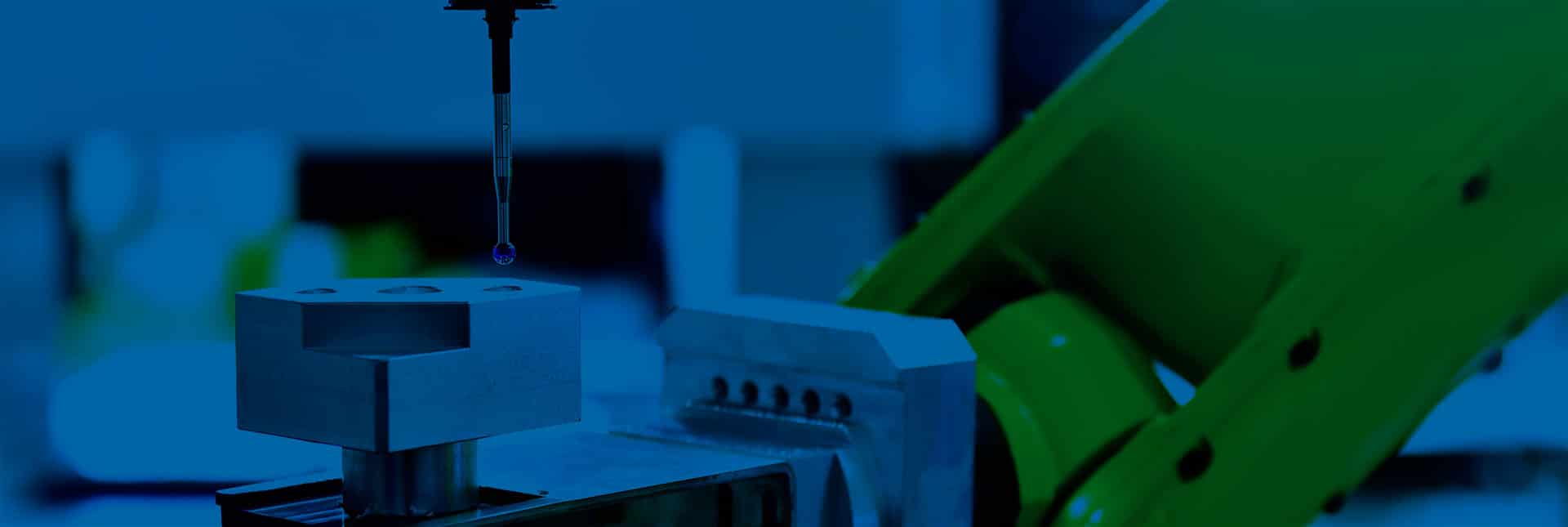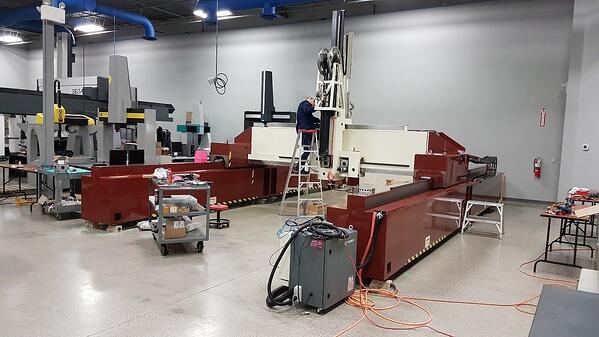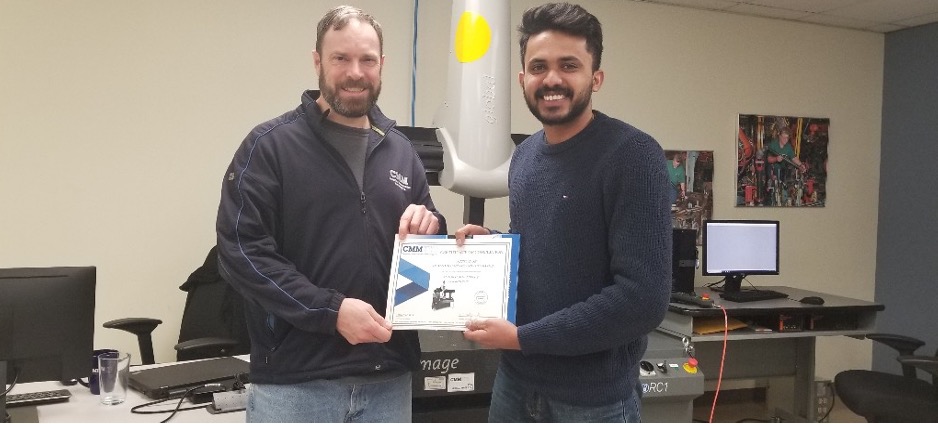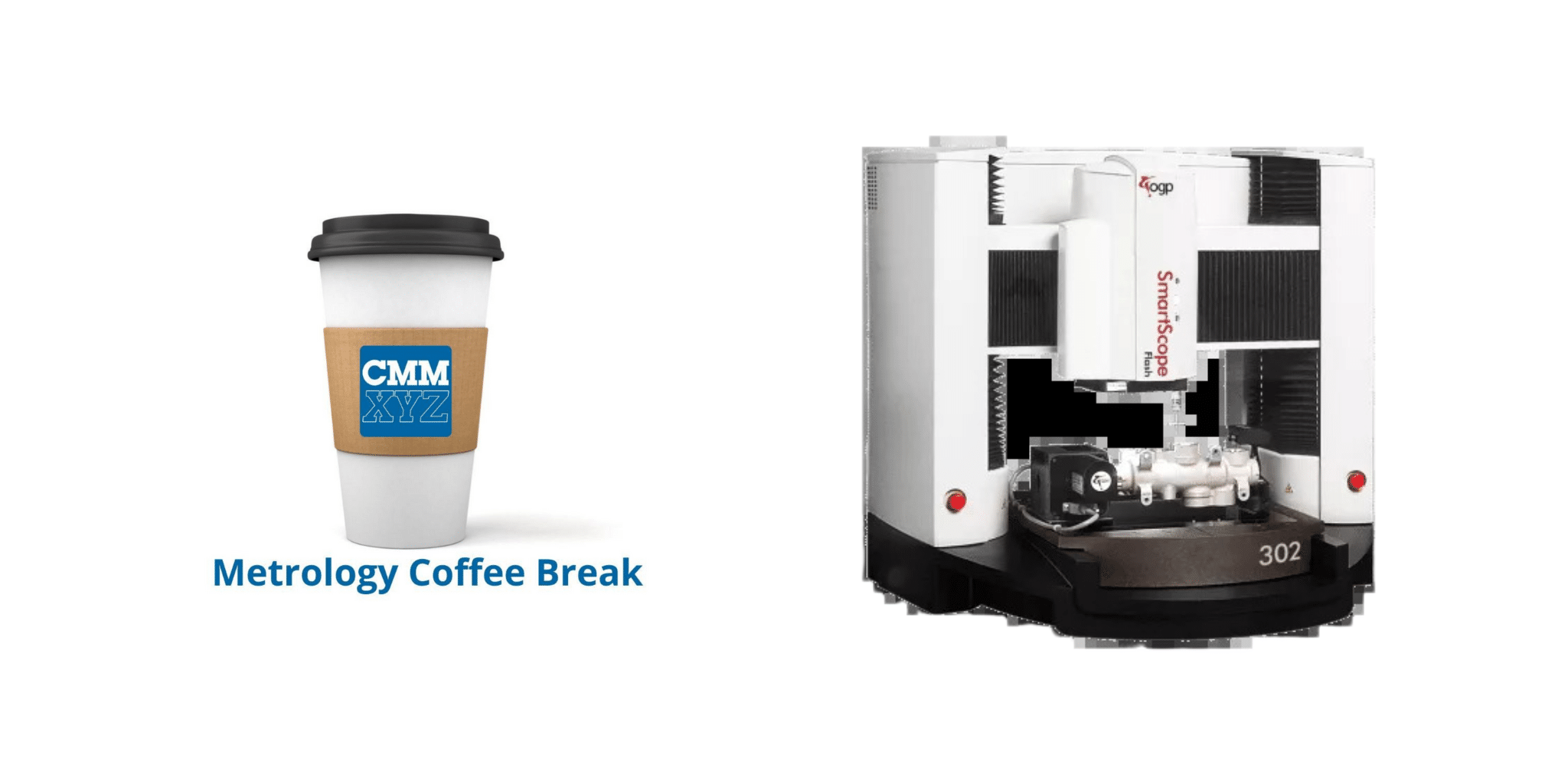David: Thank you for joining us today on Hexagon TV. I'm your host David Hill. Welcome to Channel Partner Corner, and today we're gonna be talking to Elliott from CMMXYZ, and thank you very much Elliott for joining us today.
Elliott: Glad to be here David.
David: Excellent. Excellent. Elliot, you've been involved with metrology for many years, and a Hexagon Partner for 27 years. Can you share the history of CMMXYZ, and how your company's changed over the years?
Elliott: Yes. We started the company in 1986 for an excellent reason. I was fired from my previous job, which is always a good incentive. We started actually, as a distributor in Canada for Sheffield Measurement, selling Coordinate Measuring Machines. And then in 1990, we were approached by Brown and Sharpe at that time...we then have remained a Brown and Sharpe distributor ever since.
The company has grown from just myself, that used to sell, install, calibrate and train people on machines, to a company of over 50 people. In fact today, we are the largest independent metrology dealer in Canada.
David: Nice. Nice. So we're looking 27 years that you've been in the business. Given that vintage, Elliot, is selling different today than it was when you started?
Elliott: You know, Dave, I...and you're not the first person to ask this question. It is a more sophisticated world in terms of products, services. However, I would say that probably as in the United States, it's still a people business. It's still a personal business. People buy from people they trust and respect. And so I really don't think in 30 years that has changed. It's that personal relationship that counts, maybe more so today than in the past.
David: Yeah. Very true. Very true. What would you say are CMMXYZ's strengths? What can you offer Canadian manufacturers that maybe other companies cannot?
Elliott: Well, we're not simply a sales company. The core of our business is sales. However, that is reinforced by our applications group. We have a very talented group of applications software specialist, maybe some of the best metrologists in Canada. They are responsible for support on software maintenance agreements, writing specialized software, and of course, we have our own training facility so we can offer that support.
We are the largest service group in Canada when it comes to calibrations, retrofits, rebuilds, and servicing of machines within Canada. We also have a measurement services group. So the unique thing is all the products we sell we use in our measurement services group. So anything from blue light scanning, anything...white light, portable arms, Coordinate Measuring Machines, laser trackers, we have a breadth of product and experience in our measurement services group. So I think that makes us rather unique.
David: Yeah, I would say bringing that type of expertise to the market where you walk the walk. You understand the equipment and the process is a huge advantage to the customer.
Elliott: It is a big advantage because people buy from people...they want to trust that someone can look after them.
David: Absolutely.
Elliott: And we can. Right through the...you know, a sale doesn't end in you receiving the box. We're not like Amazon. Essentially, when we deliver the product to a customer we're able to train him on that product, we're able to support him on that product, and that's what makes us unique within Canada.
David: So being here at Hexagon LIVE and looking at all of the technologies and it's evident. I mean it's changing at a tremendous rate. What would you say is the technology that had the biggest impact?
Elliott: Are we talking within the Canadian market?
David: Yeah. Sure.
Elliott: Okay. I would have to say the proliferation of non-contact devices. At one time, as you know, when we sold articulating arms or portable arms, they were a tactile device. Today, 95% of all portable arms we sell are laser. We have a great deal of interest within our customer group for scanning technologies. So I would have to say that that is the biggest influence on not only our sales group, but also our measurement services group. There's a tremendous demand for the new type of product which includes non-contact.
David: Well, that's a good segue into the next question. So Canadian Measurement, CMMXYZ, you've recently taken on the Icon line of structured-light scanners and photogrammetry. So what would you say is the benefit of the icon structured light?
Elliot: I think what we've noticed is a proliferation of additive manufacturers.
David: Sure.
Elliott: And they require something different. And actually, before the time that we took on the Icon line, we really didn't have the product that could really fit. Icon gives us the ability for rapid measurement at sub 30-micron accuracies with unprecedented detail on the components. And it's not just additive manufacturing, but it gets into a whole area of products such as tooling, dies and smaller components. So I think that we're ready for the challenge of additive manufacturing with the Icon product, David.
David: So, you know, when you speak of the accuracies and the detail that you can achieve with the Icon product, obviously that would apply to reverse engineering. But what would you say is an advantage of scanning today or digitizing today versus conventional measurement?
Elliott: Well, if conventional measurement you mean tactile or touch...
David: Absolutely.
Elliott: I think the...well, there's several reasons. One, is the massive collection of copious data in one hundredth of the time it takes a Coordinate Measuring Machine. So we can measure components that at one time took three or four hours, we can measure those components in 5, 10 minutes. That's one thing. And of course, the more data you gather, the better the representation is of the part you're measuring or reverse engineering.
The other thing that our customers really enjoy is the graphic ability to present data to them. Color maps, charts that allow the interrelationship between the quality department and the manufacturing, or the tool and die makers. Anyone can interpret our data that we present today on our digital products.
David: Additive Manufacturing. It's crazy hot topic, right? In Ontario, because it's all over the news. So whether it be prototyping, printed ABS plastics, laser centering, components that can be machined, what are the opportunities that you see as a company in this field, and how do you help move this along really? I mean, when you look at you're the largest provider of measurement services, of selling metrology equipment in Canada, I mean, this is a hot topic and it's of great opportunity for you. So where do you fit in?
Elliott: It is. I mean first of all, we're not staying at status quo. We already have two engineers that start with us in July who are strictly available for scanning CAD interpretation reverse engineering. Because there are two defined parts to the sales process, one is the ability to sell the product and demonstrate the product. But also the beauty for many of the additive manufacturers we also can measure, we also can develop as a team with them the type of data that they require.
So I think how we can help the manufacturers is without spending money on additional resources and equipment, we can measure the components for them. At that point in time, they understand the total capability of our scanning products, and then proceeds perhaps to a purchase. So I think we can really help in that area. We prove the product works.
David: Fantastic. So I gotta ask. The buzzwords: digital thread, industry 4.0, automation. I mean, automation means, you know, different things to different people. Instantly, somebody mentions automation we think a robot, it's out of line, it's picking up a part, it's welding something, and that's the immediate thought. But when you look at metrology in manufacturing, what does automation mean to you and what opportunities exist for automation with the types of equipment that you bring to market?
Elliott: Okay. I think that's a very interesting question, Dave.
David: Thank you.
Elliott: I would say you're looking for an opinion now. I can only give the answer as regards my opinion. And I would say that we do have customers already with Coordinate Measuring Machines that are involved in pallet loading and in expulsion. So we've been doing this for a long time. So it's a selling...
David: The machine tending.
Elliott: That is correct. It's semi-automatic. However, we are working with several companies as you know, as our partner to develop a totally-automated processes using white light and using laser tracker systems. So I see in the Canadian market that perhaps only 5% of our customers are looking at this today. I believe it's going to exponentially grow within the next five years, David. I really do. We can see people are very interested in the automatic process.
David: Absolutely, absolutely. I mean it's evident when you tour the zone and you look at the technologies that are available today, and what people are truly looking for from our presentations that we've attended. I mean that's truly the way the business is going.
Elliott: It is the future. It is the future.
David: So we both know that the Canadian market, the U.S. market certainly differ. But if we were looking at what exists now that would give Canadian companies, Canadian manufacturers, maybe a step up, what should they be looking at moving towards to make them more competitive in a global market?
Elliott: As we both know and I've discussed many times, the Canadian manufacturing environment is not like the U.S. manufacturing environment. Canadians are, I would say, not total innovators like their American counterparts. I think Canadians are more conservative, and most decisions in Canada take three to five times longer than the United States. I'm not saying there are not outliers to this, but for the most part, it's true. So we are slow to implement.
And I would say that when we look at the market...I'm just describing it, we're probably usually two to three years behind what's generally accepted and implemented in the United States in metrology. So I feel that with the new range of non-contact sensors, Icon, our laser, our Leica Tracker products and our CogniTens products, I think this is going to result in a dynamic change where Canadian manufacturers are going to be able to access ready data.
In fact, what we're seeing is that, at one time before you were born Dave, we sold products to purely the Quality Department. Today, the product is sold to a myriad of departments within the organization. And what's happening is quality is sharing metrology technology with manufacturing, with research and development, with the CAD people, with the engineering group. So the entire factory's buying in to our products in terms of what we can do for the entire factory. And I think this sea of change is gonna help Canadian manufacturers evolve, develop new products and processes.
David: Absolutely, absolutely. It's interesting, you know, when you wrap that all up and look at it as a closed loop. I mean, really, quality has gone from what at one point in time was a necessary evil. We need to have a machine in the back, right? Because our customer says so, to now taking, you know, the inspection to the line and collecting this actionable data and providing this information to the manufacturers for making these real time adjustments.
I mean, looking at the landscape of Canada, and I think we can agree, over the next 5 years, 10 years it's gonna change. But what would you predict? What do you see 10 years from now? What does it look like in just your opinion?
Elliott: Well, as we both know, based on current trends, we know that it's going to increased automation. It's going to increased use of non-contact sensors, and I also think, let's not forget about the data that's produced. As we know with Hexagon Metrology has within its offerings, many products that lead to the information exchange within the modern factory.
The Coordinate Measuring Machine today cannot stand alone. It cannot just be something that prints out things that enable the quality inspector to shut the line down. What we need to do is take this data and give this data in a meaningful format to various groups within the factory. And Hexagon has purchased Q-DAS I believe, and I think that Q-DAS has the ability to take this kind of data from the Coordinate Measuring Machine, and be able to deliver meaningful statistics and other types of information through the factory.
I believe that this information as we move to industry 4.0, it's starting right now. And I think in 10 years it's gonna be normal for a Coordinate Measuring Machine to communicate throughout the plant.
David: Thank you Elliott.
Elliott: You're very welcome, David.
David: For more information or episodes, please tune into hxgntv.com.




